Prospect is a monthly British general-interest magazine, specializing in politics, economics, and current affairs. Topics covered include British and other European, and US politics, social issues, art, literature, cinema, science, the media, history, philosophy, and psychology. Prospect features a mixture of lengthy analytic articles, first-person reportage, one-page columns, and shorter items.
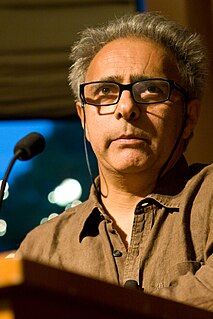
Hanif Kureishi, CBE is a British playwright, screenwriter, filmmaker and novelist of South Asian and English descent. In 2008, The Times included Kureishi in its list of The 50 greatest British writers since 1945.
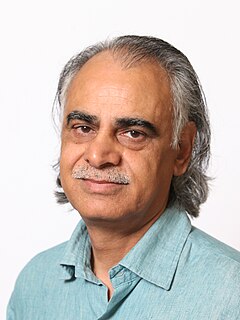
Ziauddin Sardar is a British-Pakistani scholar, award-winning writer, cultural critic and public intellectual who specialises in Muslim thought, the future of Islam, futurology and science and cultural relations. The author and editor of more than 50 books, Prospect magazine has named him as one of Britain's top 100 public intellectuals and The Independent newspaper calls him: 'Britain's own Muslim polymath'.

My Beautiful Laundrette is a 1985 British comedy-drama film directed by Stephen Frears from a screenplay by Hanif Kureishi. The film was also one of the first films released by Working Title Films.

Kundun is a 1997 American epic biographical film written by Melissa Mathison and directed by Martin Scorsese. It is based on the life and writings of Tenzin Gyatso, the 14th Dalai Lama, the exiled political and spiritual leader of Tibet. Tenzin Thuthob Tsarong, a grandnephew of the Dalai Lama, stars as the adult Dalai Lama, while Tencho Gyalpo, a niece of the Dalai Lama, appears as the Dalai Lama's mother.

Nii Ayikwei Parkes, born in the United Kingdom to parents from Ghana, where he was raised, is a performance poet, writer, publisher and sociocultural commentator. He is one of 39 writers aged under 40 from sub-Saharan Africa who in April 2014 were named as part of the Hay Festival's prestigious Africa39 project. He writes for children under the name K.P. Kojo.
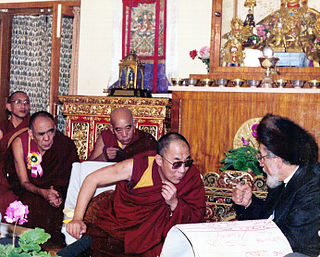
Rodger Kamenetz is an American poet and author best known for The Jew in the Lotus (1994), an account of the historic dialogue between rabbis and the XIV Dalai Lama. His poetry explores the Jewish experience and in recent years, dream consciousness. Since 2003 he's been instrumental in developing Natural Dreamwork, a practice that focuses on the sacred encounters in dreams.
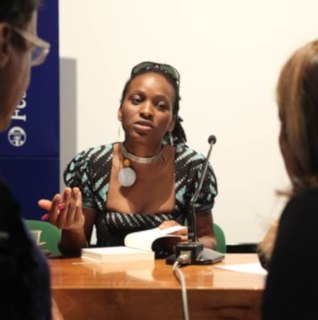
Chika Nina Unigwe is a Nigerian-born Igbo author who writes in English and Dutch. In April 2014 she was selected for the Hay Festival's Africa39 list of 39 Sub-Saharan African writers aged under 40 with potential and talent to define future trends in African literature. Previously based in Belgium, she now lives in the United States.
Religion and environmentalism is an emerging interdisciplinary subfield in the academic disciplines of religious studies, religious ethics, the sociology of religion, and theology amongst others, with environmentalism and ecological principles as a primary focus.

Yvonne Adhiambo Owuor is a Kenyan writer. She won the 2003 Caine Prize for African Writing for her story "Weight of Whispers", which considers an aristocratic Rwandan refugee in Kenya. The story was originally published in Kwani?, the Kenyan literary magazine set up by Binyavanga Wainaina after he won the Caine Prize the previous year. In 2004, she won the Woman of the year for her contributions to the arts in Kenya. In September 2015, her critically acclaimed book Dust was shortlisted for the Folio Prize, and won Kenya's pre-eminent literary prize, the Jomo Kenyatta Prize for Literature.

The 14th Dalai Lama, known as Gyalwa Rinpoche to the Tibetan people, is the current Dalai Lama, the highest spiritual leader and former head of state of Tibet. Born on 6 July 1935, or in the Tibetan calendar, in the Wood-Pig Year, 5th month, 5th day. He is considered a living Bodhisattva; specifically, an emanation of Avalokiteśvara in Sanskrit and Chenrezig in Tibetan. He is also the leader and an ordained monk of the Gelug school, the newest school of Tibetan Buddhism, formally headed by the Ganden Tripa. The central government of Tibet, the Ganden Phodrang, invested the Dalai Lama with temporal duties until his exile in 1959. On 29 April 1959, the Dalai Lama established the independent Tibetan government in exile in the north Indian hill station of Mussoorie, which then moved in May 1960 to Dharamshala, where he resides. He retired as political head in 2011 to make way for a democratic government, the Central Tibetan Administration.

Tibet was a de facto independent state between the collapse of the Manchu-led Qing dynasty in 1912 and the annexation of Tibet by the People's Republic of China in 1951.

Taiye Selasi is a British-American writer and photographer. Of Nigerian and Ghanaian origin, she describes herself as a "local" of Accra, Berlin, New York and Rome.
Afropolitan is a term constructed from the name Africa and the ancient Greek word πολίτης ('politis'), meaning 'citizen'. It is an attempt at redefining African phenomena by placing emphasis on ordinary citizens' experiences in Africa. Afropolitanism is similar to the older Panafricanism ideology. However, it defines being an "African" in explicitly continent-wide and multiracial terms, and rejects all pretensions to victimhood.
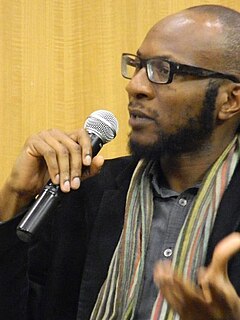
Teju Cole is a Nigerian-American writer, photographer, and art historian. He is the author of a novella Every Day Is for the Thief (2007), a novel Open City (2011), an essay collection Known and Strange Things (2016), and a photobook Punto d'Ombra. Critics have praised his work as having "opened a new path in African literature."

Michael Salu, British-born of Nigerian heritage, is a creative director, art and photography editor, designer, brand strategist, writer and illustrator.

Ghana Must Go is the debut novel of Taiye Selasi. It was published in 2013, and nominated for an NAACP Image Award. The novel follows the Sai family as they come to terms with their father Kweku Sai's death, and as they work through family troubles. Multiple points of view give insight into the characters' emotions and the repercussions of Kweku’s choices. The Wall Street Journal praised it as "irresistible from the first line".
My Spiritual Autobiography is a book published in 2009, compiled by Sofia Stril-Rever from speeches and interviews of the 14th Dalai Lama, ISBN 9781846042423.

Enkare Review is a Nairobi-based literary magazine established in August 2016, after initial conversations between Alexis Teyie, Troy Onyango, and Carey Baraka. In its short period of existence, it has published Taiye Selasi, Junot Díaz, Maaza Mengiste, Zukiswa Wanner, Namwali Serpell, Richard Ali, Lidudumalingani, Jericho Brown, Harriet Anena, Beverley Nambozo, Leila Aboulela, Nnedi Okorafor, Stanley Onjezani Kenani, Tendai Huchu, Kọ́lá Túbọ̀sún among others, and interviews with prolific African writer Chuma Nwokolo; and The New Yorker's editor, David Remnick.

Tibet House US (THUS) is a Tibetan cultural preservation and education nonprofit founded in 1987 in New York City by a group of Westerners after the Fourteenth Dalai Lama, Tenzin Gyatso, had expressed his wish to establish a cultural institution to build awareness of Tibetan culture.
















